UK floods: PM says money 'no object' in relief effort
- Published
David Cameron: "Money is no object in this relief effort"
The prime minister says money will be no object as flood relief efforts continue across swathes of the UK.
David Cameron warned the severe weather was not over, saying: "Things could get worse before they get better."
Fourteen severe flood warnings, external remain in place in Berkshire and Surrey and two remain in Somerset.
Around 1,000 properties have been evacuated, thousands more are at risk and there are warnings , externalof snow, high winds and more rain later and tomorrow.
The Met Office has issued an amber "be prepared" warning of wind on Wednesday as well as yellow "be aware" snow, wind and rain warnings.
It said the "potentially damaging winds" could be strong enough to bring down trees, causing transport and power network problems.
Speaking at a Downing Street press conference after returning from the flood-stricken South West, Mr Cameron said: "Money is no object in this relief effort. Whatever money is needed, we will spend it."
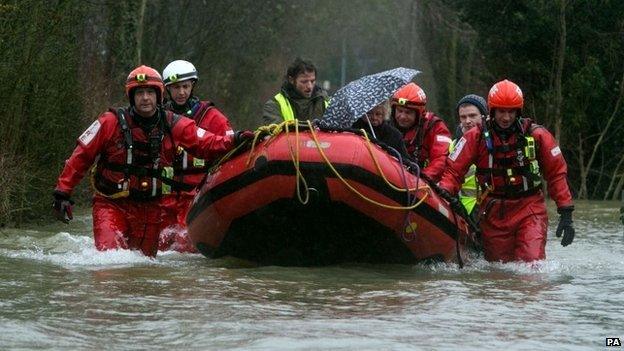
Emergency services have been working to rescue stranded residents in Wraysbury, Berkshire
The prime minister cancelled his visit to the Middle East next week to focus on the government's response to the floods, and added: "Nothing is more important than dealing with these floods."
He said recovering from the floods could take time, telling reporters: "It will be a long haul and it will require a stepped up national effort, with the whole country pulling together.
"Amidst all of this, as is so often the case, in the toughest of times we are seeing the best of Britain."
Mr Cameron announced:
Thousands more military personnel available to help in flood-hit areas - with 1,600 troops (later corrected to 600 by Downing Street) deployed by the end of Tuesday and thousands more available
Government to get insurance companies into affected areas so "people can make their claims quickly"
The Association of British Insurers and the Confederation of British Industry to meet at Downing Street later to develop support plans for businesses
Grants to help homeowners build better flood defences and repair properties
Businesses affected by floods to get "longer to pay their taxes"
Up to £10m to help farmers recover
A new cabinet committee to deal with the recovery, with Mr Cameron to chair its first meeting on Thursday
He vowed lessons would be learned, adding: "We will deal with the floods and we will build a more resilient country for the future."
The prime minister, who later chaired another Cobra emergency committee meeting, praised Environment Agency staff, saying they "have done an extraordinarily good job".
He spent two days visiting flood-hit communities across south-west England including Dawlish, Devon, where a stretch of railway was washed away in the floods, and in the South East, in Staines-upon-Thames in Surrey.
BBC chief political correspondent Norman Smith said the most striking aspect of what Mr Cameron had to say was his suggestion the government would spend whatever was needed to help get those affected get back on their feet.
It was an attempt by Mr Cameron to project himself as the national leader in charge of a national crisis, our correspondent said, adding that the prime minister had not sought to diminish the scale of the challenge ahead.
'Unprecedented'
The Met Office says it has been the wettest winter on record for south-east and central southern England since its records began in 1910.
About 1,000 homes have been evacuated along the Thames after towns and villages including Chertsey, Wraysbury and Datchet, were flooded, with thousands more properties still at risk.
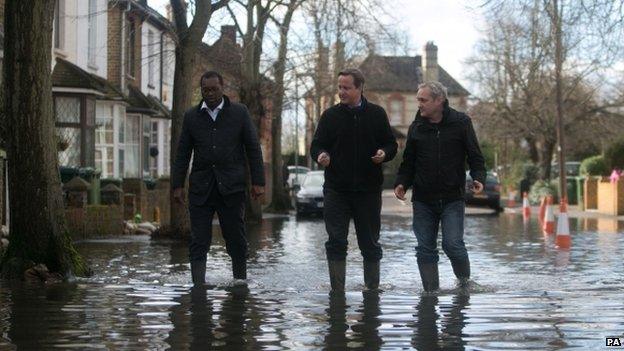
The prime minister has been visiting flood-hit areas including Staines-upon-Thames

Police officers rescued a dog from a flooded property in Egham, Surrey
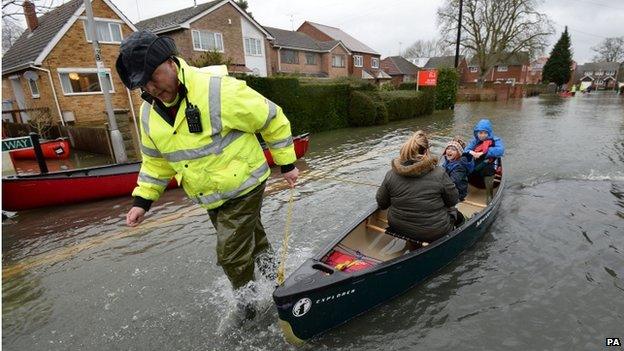
A volunteer helps ferry residents of Purley on Thames, Berkshire
Chief Supt Matt Twist, of Surrey Police, said a "major incident" had been declared in the county and the flooding was "unprecedented". A total of 2,500 homes in the county were at risk of flooding, he added.
Further evacuations have been taking place in the Staines and Egham area. More than 5,000 properties have been flooded altogether in the last two months.
The Environment Agency said it was also concerned about the River Severn and River Wye, with high levels of water in Shrewsbury and Worcester. More than 100 homes have so far been flooded in Worcester.
In developments around the affected areas:
Flood levels have affected Ironbridge in Shropshire as the River Severn continues to rise, and the local council said residents should treat it as a "serious situation"
538 people have been rescued from floods in Surrey since Sunday, Surrey Police said - more than half of those were rescued on Tuesday alone
In the Tewkesbury area, in Gloucestershire, water levels are expected to rise by a further 30cm (12in) and levels will stay elevated in parts of the county for "some time", the Environment Agency said
According to the agency, groundwater levels are so high in some parts of the country that flooding is likely to persist for weeks or even months
Sandbags were placed in the River Itchen by the Environment Agency to restrict its flow after flooding caused closures on the M3
Snowfall has affected travel in some parts of Wales, with heavy rain and coastal gales forecast
Coastal communities in Wales face being abandoned as rising sea levels mean the cost of maintaining defences can no longer be justified.
'Be prepared'
As well as there being 16 severe flood warnings the Environment Agency has also issued about 350 less serious flood warnings and alerts, external, mostly in southern England and the Midlands.
The news helicopter took a trip along the Thames to look at areas affected by flooding
There are Met Office severe weather warnings for almost the whole of the UK for Wednesday, with strong winds, snow and rain expected. Amber wind warnings, meaning "be prepared", will be in place from 10:00 GMT for parts of Wales, northern England, south-west England and the West Midlands.
A yellow warning for snow covers northern and western parts of the UK - but not the South West - for the rest of Tuesday and Wednesday.
BBC weather forecaster Louise Lear said there was the potential for storm-force gusts of wind during the afternoon, reaching speeds of 70-80mph - and maybe higher - on exposed coasts.
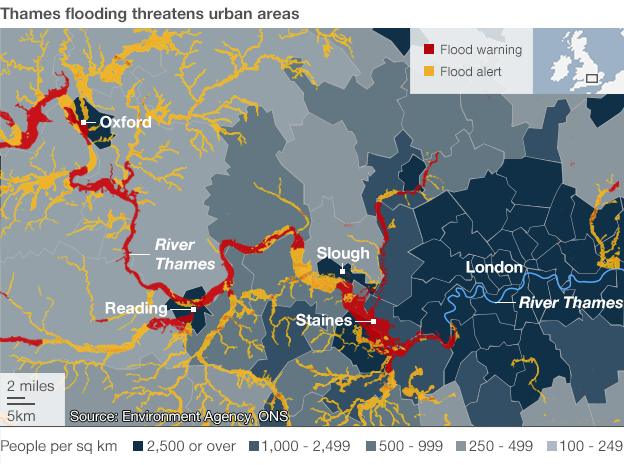
Flooding near Maidenhead has caused cancellations and severe delays on journeys between London Paddington and Reading.
First Great Western is advising passengers, external in the affected areas only to travel if it is absolutely necessary.
Spokesman Dan Panes said the problems had been caused by water getting into Network Rail's signalling and safety equipment.
BBC Weather presenter Chris Fawkes explains what's behind the seemingly endless rain
He said: "Network Rail are having to signal us into the area by hand at every single stop... it means that rather than 25 trains an hour into and out of Paddington, we are only able to run four at the moment."
Services are also suspended on South West Trains between Staines and Windsor and Eton Riverside, and the main train line from London to Cornwall remains severed at Dawlish.
'No finger pointing'
Labour leader Ed Miliband, speaking on a visit to Wraysbury, said flood defences should be made a higher priority by the government.
He said he admitted doing so would be expensive, and added: "If there's one thing we know about the effects of extreme weather, it's that the costs - financial, human and other costs - of not acting are much greater than the costs of acting.
"It's a totally false economy to say 'don't act'. The government's got to realise this and it's got to take the problem seriously."
Mr Miliband urged ministers to stop "finger pointing" and instead focus on "rolling their sleeves up and getting on with getting people the help".
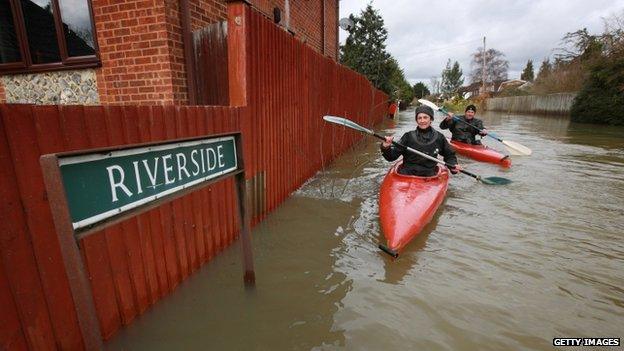
Some Wraysbury residents used canoes to make their way through the village
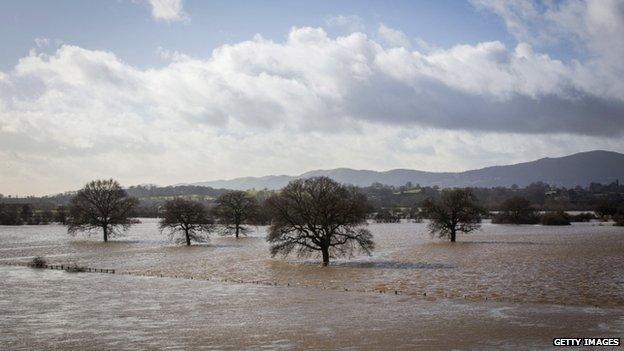
Fields near the River Severn in Worcester were also flooded